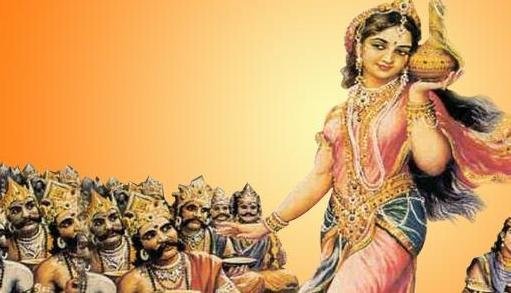The stories of Lord Vishnu in the form of Mohini—both during the Samudra Manthan and the defeat of Bhasmasura—are powerful examples of how selective honesty and strategic generosity can be used to manipulate powerful adversaries and secure victory through intellect, charm, and psychological manipulation.
In the first tale, during the churning of the Ocean of Milk (Samudra Manthan), both the Devas (demi-gods) and the Asuras (demons) sought the Amrita, the nectar of immortality, which had risen from the depths of the ocean. The Asuras, driven by their greed, schemed to take the nectar for themselves, leaving the Devas powerless. However, Lord Vishnu, ever the strategist, realized the dangers posed by the Asuras and their deceitful plan. He devised a solution that would require no direct conflict, but instead the use of charm, trust, and manipulation.
Vishnu assumed the form of Mohini, an enchanting woman of unparalleled beauty, whose allure and grace could captivate even the most powerful beings. Appearing before the Asuras, Mohini played the role of a neutral mediator, offering to distribute the Amrita fairly between the Devas and the Asuras. By acting as an impartial figure, Mohini disarmed the Asuras with her charm, giving them the false impression that they could trust her and that she would be fair in her distribution of the nectar. This selective honesty lulled the Asuras into complacency, making them believe that their interests were being safeguarded.
While the Asuras were distracted by Mohini’s beauty and charm, she cunningly diverted the Amrita to the Devas, ensuring that they consumed it and gained immortality, while the Asuras were left with nothing. This strategic use of “honesty” created an illusion of fairness that achieved Vishnu’s goal without the need for confrontation. The Asuras, blinded by their own greed and arrogance, were tricked into giving up their claim to the nectar.
The deception was further solidified when an Asura named Rahu, disguised as a Deva, attempted to drink some of the Amrita. The Sun and Moon gods, Surya and Chandra, quickly alerted Vishnu, who used his Sudarshana Chakra to sever Rahu’s head. The head remained alive, forever symbolizing the consequences of deceit and the importance of maintaining fairness.
In the second story, Vishnu as Mohini faces another challenge: the demon Bhasmasura, who had been granted a deadly boon by Lord Shiva. The boon allowed Bhasmasura to turn anyone to ashes by simply placing his hand on their head. Drunk with power, Bhasmasura began to misuse his gift, terrorizing the gods and threatening to destroy all of creation. The gods, helpless in the face of his strength, sought Vishnu’s help once again.
Vishnu, known for his wisdom and strategic insight, assumed the form of Mohini once more. This time, his goal was not only to defeat Bhasmasura but to exploit his vanity and arrogance. When Mohini appeared before the demon, Bhasmasura was immediately taken by her beauty and grace. Mohini, with perfect timing, complimented Bhasmasura on his strength, praising his power and abilities. This selective honesty fed into Bhasmasura’s inflated ego, making him feel respected and invincible.
With Bhasmasura’s vanity firmly in place, Mohini suggested a dance competition, appealing to his pride. Flattered by her attention, Bhasmasura eagerly agreed, believing that his skill would outshine any opponent. As the dance progressed, Mohini performed intricate and mesmerizing movements, subtly guiding Bhasmasura into mimicking her actions. Enthralled by her beauty and desirous of impressing her, Bhasmasura blindly followed her every step.
At the height of the dance, Mohini made a calculated move—she placed her hand on her own head. Bhasmasura, eager to match her every step, mirrored the action and placed his hand on his own head. The moment he did so, the boon granted by Lord Shiva took effect, and Bhasmasura was immediately turned to ashes.
In both tales, Vishnu’s use of selective honesty and calculated generosity proved to be the decisive factor in overcoming powerful adversaries. Whether disarming the Asuras to steal the Amrita or manipulating Bhasmasura into his own demise, Mohini’s charm, strategic complements, and acts of perceived generosity were used to achieve goals without direct confrontation. These stories serve as a reminder of the power of intellect over brute strength and the importance of manipulating perceptions to achieve one’s desired outcomes.

Leave a Reply